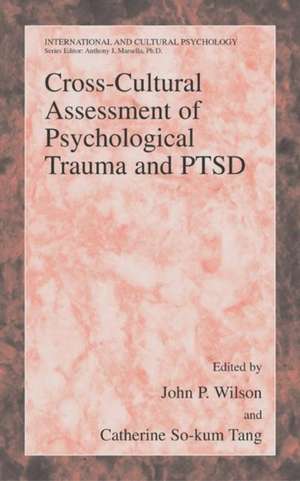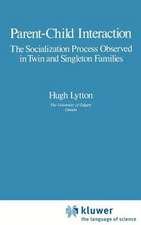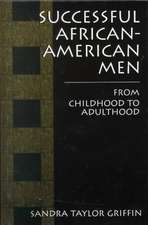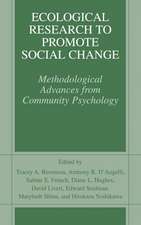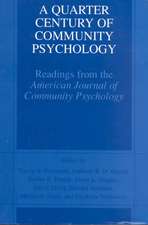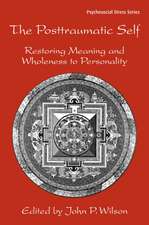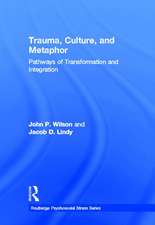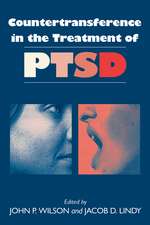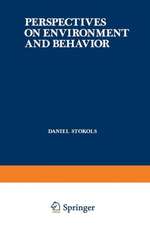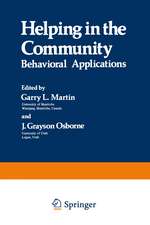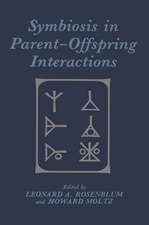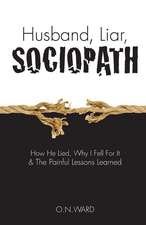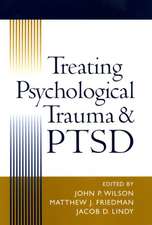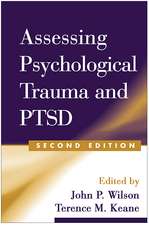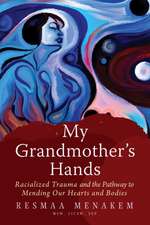Cross-Cultural Assessment of Psychological Trauma and PTSD: International and Cultural Psychology
Editat de John P. Wilson, Catherine C. So-Kum Tangen Limba Engleză Hardback – 20 iun 2007
| Toate formatele și edițiile | Preț | Express |
|---|---|---|
| Paperback (1) | 703.52 lei 6-8 săpt. | |
| Springer Us – 25 noi 2010 | 703.52 lei 6-8 săpt. | |
| Hardback (1) | 956.99 lei 6-8 săpt. | |
| Springer Us – 20 iun 2007 | 956.99 lei 6-8 săpt. |
Din seria International and Cultural Psychology
- 18%
 Preț: 1117.03 lei
Preț: 1117.03 lei - 17%
 Preț: 490.68 lei
Preț: 490.68 lei - 15%
 Preț: 587.02 lei
Preț: 587.02 lei - 15%
 Preț: 647.40 lei
Preț: 647.40 lei - 5%
 Preț: 718.10 lei
Preț: 718.10 lei - 24%
 Preț: 797.39 lei
Preț: 797.39 lei - 20%
 Preț: 564.52 lei
Preț: 564.52 lei - 18%
 Preț: 1693.62 lei
Preț: 1693.62 lei - 18%
 Preț: 1010.48 lei
Preț: 1010.48 lei - 18%
 Preț: 784.13 lei
Preț: 784.13 lei - 18%
 Preț: 780.52 lei
Preț: 780.52 lei - 18%
 Preț: 946.24 lei
Preț: 946.24 lei - 15%
 Preț: 641.85 lei
Preț: 641.85 lei - 18%
 Preț: 952.57 lei
Preț: 952.57 lei - 5%
 Preț: 1031.68 lei
Preț: 1031.68 lei - 15%
 Preț: 637.13 lei
Preț: 637.13 lei - 5%
 Preț: 708.78 lei
Preț: 708.78 lei - 15%
 Preț: 476.75 lei
Preț: 476.75 lei - 18%
 Preț: 1120.18 lei
Preț: 1120.18 lei - 15%
 Preț: 638.76 lei
Preț: 638.76 lei - 20%
 Preț: 556.10 lei
Preț: 556.10 lei - 15%
 Preț: 700.10 lei
Preț: 700.10 lei - 15%
 Preț: 697.94 lei
Preț: 697.94 lei - 5%
 Preț: 1095.90 lei
Preț: 1095.90 lei - 18%
 Preț: 999.94 lei
Preț: 999.94 lei - 24%
 Preț: 842.28 lei
Preț: 842.28 lei - 15%
 Preț: 646.62 lei
Preț: 646.62 lei - 18%
 Preț: 947.95 lei
Preț: 947.95 lei - 18%
 Preț: 892.74 lei
Preț: 892.74 lei - 5%
 Preț: 1098.27 lei
Preț: 1098.27 lei - 20%
 Preț: 552.45 lei
Preț: 552.45 lei - 15%
 Preț: 649.54 lei
Preț: 649.54 lei - 18%
 Preț: 785.55 lei
Preț: 785.55 lei - 18%
 Preț: 947.67 lei
Preț: 947.67 lei - 18%
 Preț: 947.98 lei
Preț: 947.98 lei - 18%
 Preț: 952.26 lei
Preț: 952.26 lei
Preț: 956.99 lei
Preț vechi: 1167.06 lei
-18% Nou
Puncte Express: 1435
Preț estimativ în valută:
183.11€ • 191.21$ • 151.21£
183.11€ • 191.21$ • 151.21£
Carte tipărită la comandă
Livrare economică 15-29 aprilie
Preluare comenzi: 021 569.72.76
Specificații
ISBN-13: 9780387709895
ISBN-10: 0387709894
Pagini: 405
Ilustrații: XXVI, 405 p.
Dimensiuni: 155 x 235 x 24 mm
Greutate: 0.78 kg
Ediția:2007
Editura: Springer Us
Colecția Springer
Seria International and Cultural Psychology
Locul publicării:New York, NY, United States
ISBN-10: 0387709894
Pagini: 405
Ilustrații: XXVI, 405 p.
Dimensiuni: 155 x 235 x 24 mm
Greutate: 0.78 kg
Ediția:2007
Editura: Springer Us
Colecția Springer
Seria International and Cultural Psychology
Locul publicării:New York, NY, United States
Public țintă
Professional/practitionerCuprins
Theoretical And Conceptual Considerations In The Cross-Cultural Assessment Of Psychological Trauma.- The Lens of Culture: Theoretical and Conceptual Perspectives in the Assessment of Psychological Trausma and PTSD.- Cultural–Ecological Perspectives on the Understanding and Assessment of Trauma.- Ethnomedical Best Practices for International Psychosocial Efforts in Disaster and Trauma.- Assessing Trauma Across Cultures from a Multigenerational Perspective.- Refugee Assessment Practices and Cultural Competency Training.- Wrestling with the Ghosts from the Past in Exile: Assessing Trauma in Asylum Seekers.- Assessment Methods.- Assessment of PTSD and Psychiatric Comorbidity in Contemporary Chinese Societies.- Culture and the Assessment of Trauma in Youths.- The Peritraumatic Dissociative Experiences Questionnaire An International Perspective.- The Impact of Event Scale: Revised.- Posttraumatic Stress in Asylum Seekers from Chechnya, Afghanistan, and West Africa: Differential Findings Obtained by Quantitative and Qualitative Methods in Three Austrian Samples.- Trauma And Cultural Adaptation.- The Cross-Cultural Assessment of Dissociation.- Mass Psychological Trauma and PTSD: Epidemic Illusion?.- Assessment of Trauma for Aboriginal People.- Combined Psychosocial and Pharmacological Treatment of Traumatized Refugees.- Western Psychiatry and Difficulty: Understanding and Treating Hmong Refugees.
Notă biografică
John P. Wilson is a Professor of Psychology and Fulbright Scholar at Cleveland State University. He is co-founder and past president of the International Society for Traumatic Stress Studies and the author of 10 books; 40 chapters and many articles on PTSD.
Catherine So-kum Tang graduated from the University of North Texas with a Ph.D. in Clinical Psychology. She is a Professor in the Department of Psychology at the Chinese University of Hong Kong. She was the former Director of the Graduate Studies in clinical Psychology and Gender Studies Program, and is currently Director of the new postgraduate program in trauma-related studies. She has published widely in international journals on violence against women, family violence, clinical aspects of social issues, AIDS/HIV prevention, and trauma psychology.
Catherine So-kum Tang graduated from the University of North Texas with a Ph.D. in Clinical Psychology. She is a Professor in the Department of Psychology at the Chinese University of Hong Kong. She was the former Director of the Graduate Studies in clinical Psychology and Gender Studies Program, and is currently Director of the new postgraduate program in trauma-related studies. She has published widely in international journals on violence against women, family violence, clinical aspects of social issues, AIDS/HIV prevention, and trauma psychology.
Textul de pe ultima copertă
Recent advances in trauma treatment, coupled with ongoing traumatic world events, point to a critical need for global standards in assessment. But despite the best intentions of Western psychology, one model does not fit all cultures. Cross-Cultural Assessment of Psychological Trauma and PTSD addresses key issues in the field to help fill this knowledge gap.
Focusing equally on theoretical concepts, culturally valid assessment methods, and cultural adaptation in trauma and resilience, 29 experts present the cutting edge of research and strategies. Extended case examples (including West Africans in Austria, Hmong in the U.S., and Aboriginal people in Australia) illustrate an informative range of symptom profiles, comorbid conditions, and coping skills, as well as secondary traumas that can occur in asylum seekers. Professional concerns are also highlighted, from training and competency issues to the challenges of translating assessment into treatment. The results are a vital set of insights and guidelines that will contribute to more aware and meaningful practice.
Included in the coverage:
Focusing equally on theoretical concepts, culturally valid assessment methods, and cultural adaptation in trauma and resilience, 29 experts present the cutting edge of research and strategies. Extended case examples (including West Africans in Austria, Hmong in the U.S., and Aboriginal people in Australia) illustrate an informative range of symptom profiles, comorbid conditions, and coping skills, as well as secondary traumas that can occur in asylum seekers. Professional concerns are also highlighted, from training and competency issues to the challenges of translating assessment into treatment. The results are a vital set of insights and guidelines that will contribute to more aware and meaningful practice.
Included in the coverage:
- Twenty-one questions central to understanding trauma in cultural context.
- In-depth studies on the effects of trauma over multiple generations, and developmental issues among traumatized youth.
- A review of traditional interventions and current trauma assessment practice from China.
- Reports on the combined use of psycho- and pharmacotherapy in treating refugees.
- Cross-cultural perspectives on the Impact of Events Scale—Revised and other widely used assessment methods.
- Renewed debates over the nature of PTSD as a reaction to mass trauma.
Caracteristici
Approaches the issue of PTSD from a global viewpoint Emphasizes the needs for global standardization of methods, procedures, and techniques of the scientific assessment of PTSD and psychological injuries Includes supplementary material: sn.pub/extras
